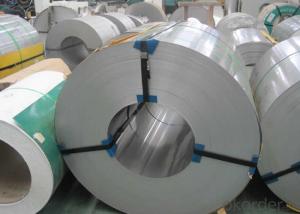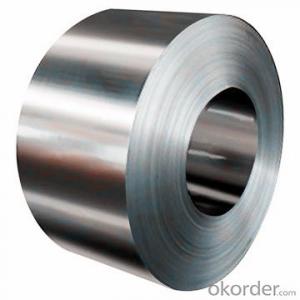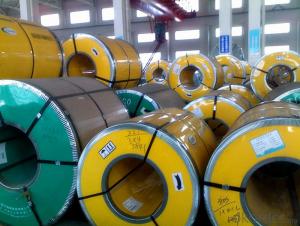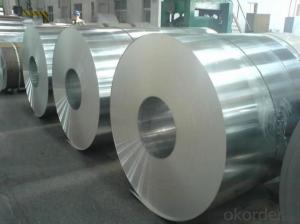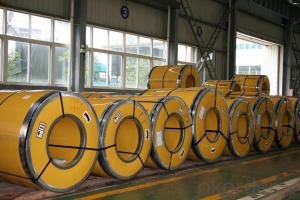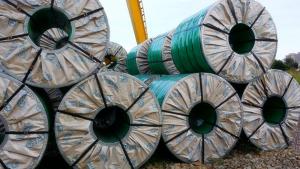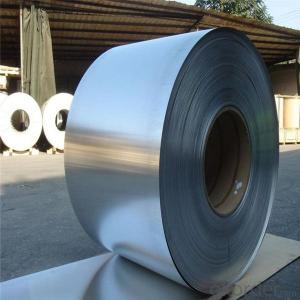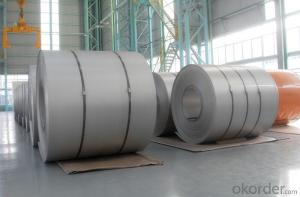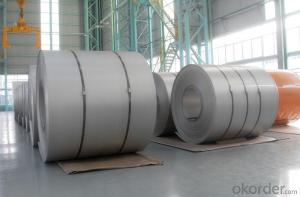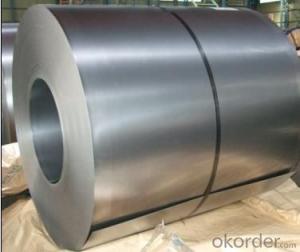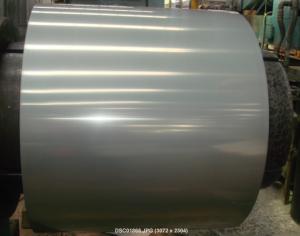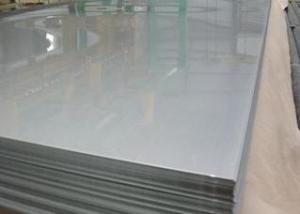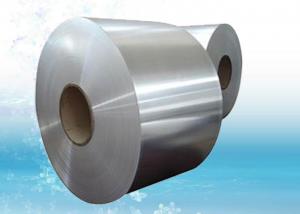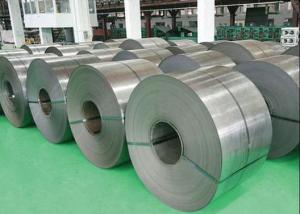430 SERIOUS HOT ROLLED STAINLESS STEEL COILS/SHEETS
- Loading Port:
- Guangzhou
- Payment Terms:
- TT OR LC
- Min Order Qty:
- 100 m.t.
- Supply Capability:
- 20000 m.t./month
OKorder Service Pledge
OKorder Financial Service
You Might Also Like
Quick Details
| Grade: | 400 Series | Standard: | JIS,AISI,ASTM,GB,DIN,EN | Thickness: | 0.21-3.0mm |
| Width: | 345-550mm | Place of Origin: | Guangdong China (Mainland) | Model Number: | 430 |
| Technique: | Hot Rolled | Application: | Kitchenware, decoration,plate , kitchenware , tableware , hardware, da | Certification: | ISO |
Packaging & Delivery
| Packaging Detail: | wooden pallet |
| Delivery Detail: | 30 days after receiving deposit |
Specifications
stainless steel coil
1)Surface:No.1
2)Thickness:2.4-4.0mm
3)Width:345-550mm
With advanced equipment and high technique , we specialize in manufacturing hot rolled stainless coils and cold rolled stainless coils of 201 ,202 ,304 . The hot rolled coils thickness is in range of 2.4mm -- 4.0mm , width of 345 to 555mm . The cold rolled coils thickness is in range of 0.23mm --3.0mm ,width of 345 to 55o mm. We supply a vast variety of qualified products in various specifications .Our products are widely applied in plate , kitchenware , tableware , hardware, daily products , decorative pipe and tube, hinge , etc. Our annual output exceeds 200,000 MT per year.
We adhere to the aim of “ High Quality and High Efficiency can win customer Satisfaction .” Quality is our sincerest respect offered to our customers all over the world , and it is the most important factor for us to win our customers’ hearts and establish
the long-term business relationships with our customers .
We hope to settle longlasting and honest cooperation with you. We will try our best to supply the best quality and price products to you. Developing together with our customers is our final faith.
Contact us !
Product Description
1)Chemical composition
C | Si | Mn | P | S | Cr | |
0.12 | 1.00 | 1.00 | 0.04 | 0.030 | 16-18 | |
0.12 | 1.00 | 1.00 | 0.04 | 0.030 | 16-18 |
- Q: Can stainless steel strips be used in electronics applications?
- Yes, stainless steel strips can be used in electronics applications. Stainless steel is known for its excellent corrosion resistance, high strength, and durability, making it suitable for various electronic components and applications. It is often used in the manufacturing of connectors, terminals, springs, battery contacts, and shielding, among others. Stainless steel strips can provide electrical conductivity, thermal stability, and resistance to vibration and mechanical stress, making them reliable for use in electronic devices. Additionally, stainless steel is non-magnetic, which can be beneficial for certain applications where magnetic interference needs to be minimized.
- Q: Which stainless steel belt has better elasticity?
- In stainless steel strips, SUS301 has the best elasticity, and is used for springs, springs, or EH, or spring.
- Q: How do stainless steel strips perform in the presence of hydrochloric acid?
- Stainless steel strips exhibit excellent performance when exposed to hydrochloric acid, thanks to their superior corrosion resistance properties. Unlike most metals that succumb to the corrosive nature of hydrochloric acid, stainless steel possesses a unique composition that renders it impervious to this form of chemical attack. The inclusion of chromium in stainless steel prompts the formation of a protective oxide layer on its surface, effectively preventing the acid from penetrating and causing corrosion. Furthermore, the presence of nickel in stainless steel further bolsters its resistance against acids. Nevertheless, it is crucial to note that the effectiveness of stainless steel in hydrochloric acid can vary based on the grade and specific conditions of exposure. For particularly aggressive acid environments, higher grades of stainless steel, such as 316 or 904L, are often preferred. To ensure the appropriate selection of stainless steel grade for specific hydrochloric acid applications, it is advisable to seek advice from material experts or consult corrosion resistance charts.
- Q: How do stainless steel strips handle vibration and shock?
- Stainless steel strips are known for their excellent resistance to vibration and shock. This is primarily due to their inherent mechanical properties and composition. Stainless steel is a high-strength material with low elastic modulus, meaning it has the ability to absorb and distribute energy upon impact or when subjected to vibration. This property allows stainless steel strips to effectively dampen vibrations and prevent the transmission of shockwaves. In addition, stainless steel is highly resistant to corrosion, which ensures the durability and longevity of the strips even in harsh environments. This corrosion resistance also helps maintain the structural integrity of the material, making it less susceptible to damage from vibrations and shocks. Furthermore, stainless steel strips can be manufactured with specific alloys and finishes that further enhance their ability to handle vibration and shock. For example, certain grades of stainless steel can be heat-treated or cold-rolled to enhance their strength and reduce the risk of deformation under impact. Overall, stainless steel strips are well-equipped to handle vibration and shock due to their high-strength properties, low elastic modulus, corrosion resistance, and the ability to customize their composition for specific applications.
- Q: Can stainless steel strips be used for structural applications?
- Yes, stainless steel strips can be used for structural applications. Stainless steel is known for its excellent corrosion resistance, high strength, and durability, making it suitable for various structural applications. Stainless steel strips can be used in the construction of buildings, bridges, and other infrastructure projects. They can also be used in the manufacturing of machinery, automotive components, and appliances. The versatility of stainless steel strips allows them to be formed, welded, and manipulated into various shapes and sizes, making them ideal for structural purposes. Additionally, stainless steel's aesthetic appeal and low maintenance requirements make it a popular choice for architectural applications. Overall, stainless steel strips are a reliable and effective material for structural applications.
- Q: What are the different surface patterns available for stainless steel strips?
- There are various surface patterns available for stainless steel strips, each offering unique characteristics and aesthetics. Some of the commonly used surface patterns include: 1. No. 1 Finish: This is the most common and widely used surface finish for stainless steel strips. It has a dull, rough, and non-reflective surface, often achieved through hot rolling methods. 2. No. 2B Finish: This finish is achieved through a further cold rolling process after the No. 1 finish. It has a slightly smoother and brighter appearance compared to the No. 1 finish, with a moderate level of reflectivity. 3. No. 3 Finish: Also known as a brushed finish, this surface pattern is achieved by brushing the stainless steel strip with abrasive materials. It creates a distinctive linear brushed pattern, giving the strip a textured and matte appearance. 4. No. 4 Finish: This is a highly popular surface pattern for stainless steel strips. It is achieved by polishing the strip with finer abrasives, resulting in a smoother and more reflective surface compared to the No. 3 finish. It has a satin-like appearance. 5. No. 8 Mirror Finish: This is the highest level of polish achievable for stainless steel strips. It undergoes a series of polishing steps to achieve a reflective, mirror-like surface. It is often used in architectural applications and decorative purposes. 6. Embossed Patterns: Stainless steel strips can also be embossed with various patterns, such as diamond, linen, or leather grain. These patterns are created by pressing the stainless steel strip between embossing rollers, resulting in textured surfaces with a visually appealing look. 7. Perforated Patterns: Perforated stainless steel strips are created by punching holes in the strip using specialized machinery. Different hole patterns, shapes, and sizes can be achieved, allowing for enhanced functionality and design possibilities. These different surface patterns for stainless steel strips offer versatility and cater to various applications, including architectural, automotive, household appliances, and decorative uses. The choice of surface pattern depends on the desired aesthetic appearance, functionality, and specific requirements of the project.
- Q: What is the corrosion resistance of stainless steel strips in saltwater?
- Stainless steel strips have excellent corrosion resistance in saltwater due to their high chromium content, which forms a protective oxide layer on the surface, preventing corrosion and rusting. This makes stainless steel strips a suitable choice for various marine applications.
- Q: Can stainless steel strips be used for architectural sculptures?
- Yes, stainless steel strips can be used for architectural sculptures. Stainless steel is a versatile and durable material that can be easily manipulated into various shapes and forms. Its corrosion-resistant properties make it ideal for outdoor sculptures, as it can withstand harsh weather conditions without rusting or deteriorating. Stainless steel strips can be cut, bent, and welded to create intricate designs and unique sculptures. The strips can be formed into different shapes, such as curves, waves, or straight lines, allowing for endless creative possibilities. Additionally, stainless steel can be polished or brushed to achieve different finishes, giving the sculptures a sleek and modern look. Architectural sculptures often require materials that are not only visually appealing but also long-lasting and low-maintenance. Stainless steel meets these criteria, making it an excellent choice for architectural sculptures. Its strength and resistance to corrosion make it suitable for both indoor and outdoor installations. Furthermore, stainless steel's reflective surface can create interesting visual effects, especially when combined with lighting. The sculpture can capture and reflect the surrounding environment, enhancing its visual impact and creating a dynamic and engaging experience for viewers. In conclusion, stainless steel strips can indeed be used for architectural sculptures. Their versatility, durability, and aesthetic appeal make them a popular choice for artists and architects looking to create unique and long-lasting sculptures.
- Q: How do stainless steel strips perform in high-temperature steam?
- Stainless steel strips are known for their excellent performance in high-temperature steam environments. Due to their unique composition, stainless steel strips possess high corrosion resistance, even when exposed to aggressive steam conditions. The chromium content in stainless steel forms a protective layer of chromium oxide on the surface of the strips, which acts as a barrier against corrosion and prevents the material from reacting with the steam. This protective layer is stable even at high temperatures, ensuring the stainless steel strips maintain their integrity and performance in steam environments. Additionally, stainless steel strips have high strength and toughness, allowing them to withstand the mechanical stresses and pressures associated with high-temperature steam applications. Overall, stainless steel strips are a reliable and durable choice for use in high-temperature steam environments, providing long-lasting performance and corrosion resistance.
- Q: How do you determine the mechanical properties of a stainless steel strip?
- To determine the mechanical properties of a stainless steel strip, various testing methods can be employed. These include tension tests to measure the strip's ultimate tensile strength, yield strength, and elongation. Hardness tests can be conducted to determine the strip's resistance to indentation or scratching, while impact tests can assess its ability to withstand sudden forces. Additionally, bending tests can help determine the strip's flexibility and ductility. Overall, a combination of these tests provides a comprehensive understanding of the mechanical properties of a stainless steel strip.
Send your message to us
430 SERIOUS HOT ROLLED STAINLESS STEEL COILS/SHEETS
- Loading Port:
- Guangzhou
- Payment Terms:
- TT OR LC
- Min Order Qty:
- 100 m.t.
- Supply Capability:
- 20000 m.t./month
OKorder Service Pledge
OKorder Financial Service
Similar products
Hot products
Hot Searches
Related keywords
